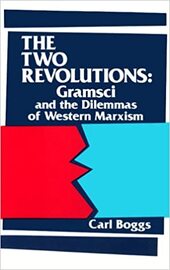BOOKS
THE TWO REVOLUTIONS: GRAMSCI AND THE DILEMMAS OF WESTERN MARXISM by Carl Boggs
South End Press, 1984
This book explores at length the three general dimensions of Antonio Gramsci’s epic theorizing – the council tradition, Communism, and Western Marxism. These elements coexisted uneasily in Gramsci’s thought, especially after the rise of fascism and the materials assembled for the iconic Prison Notebooks. One unique contribution here is the extensive comparison of Gramsci’s work with that of a range of other mostly contemporary theorists: Lenin, Bordiga, Labriola, Lukacs, Sorel, Luxemberg, Reich, others. In the end, Gramsci is situated within an interregnum where the old strategic approaches have faltered and new ones are beginning to surface.
“In this remarkable political and theoretical assessment of the life and work of Antonio Gramsci, the author examines a daring new conception of the relations between politics, economics, ideology, and society. . . . The volume marks the first systematic effort to compare Gramsci with the leading Marxist and radical theorists of his time. [It finally] draws a number of lessons for contemporary political thought and practice suggested by Gramsci’s rich contributions.”
Michael Albert
Co-founder of South End Press
“In this remarkable political and theoretical assessment of the life and work of Antonio Gramsci, the author examines a daring new conception of the relations between politics, economics, ideology, and society. . . . The volume marks the first systematic effort to compare Gramsci with the leading Marxist and radical theorists of his time. [It finally] draws a number of lessons for contemporary political thought and practice suggested by Gramsci’s rich contributions.”
Michael Albert
Co-founder of South End Press
